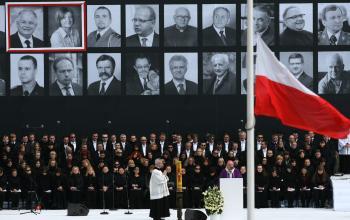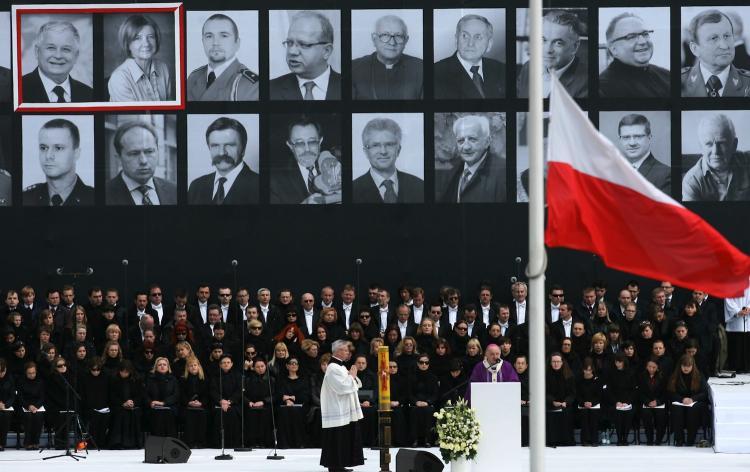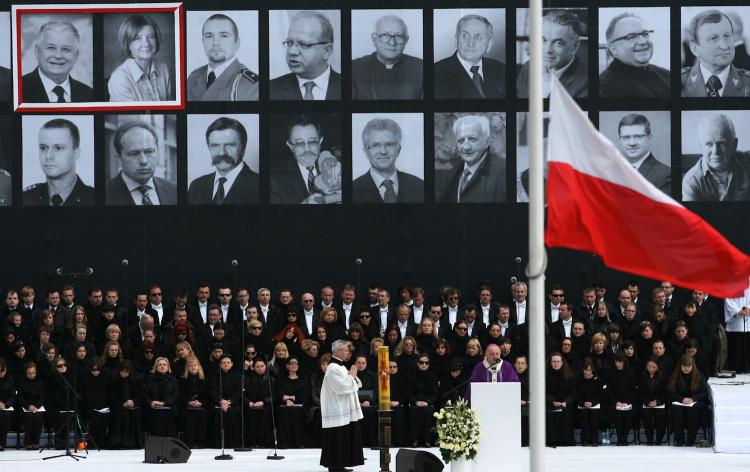WARSAW, Poland—The invectives hurled down from the parliamentary viewing gallery punctuating the prime minister’s televised remarks during last week’s debate on the Polish government’s handling of the Smolensk air crash investigation were unusually fiery: “Treason!” and “This is a disgrace!” and “This man shouldn’t be prime minister!”
And while it’s a tragedy of staggering proportions still enshrouded by an aura of mystery, it has in due course become overshadowed by a hyper-politicized crescendo of partisan battle cries that have in concert caused a national neurosis over the issue.
When the Russian-made Tupolev TU-154M slammed into the ground in its country of origin that fateful morning on April 10 last year killing all 96 passengers on board, including the president of Poland and first lady, there was little doubt that the fallout was going to be big. Many of the victims were high-level officials, and some major public institutions—such as the Polish central bank—lost their chiefs. Nominating their replacements proved a bit tricky, both technically and politically. Some of the decisions for replacement were widely criticized as politically expedient certainly, yet inelegant in the traumatized post-Smolensk public reality.
It’s moves like this that give impetus to the line of argument consistently upheld by the main opposition party, Law and Justice, founded by Jaroslaw Kaczynski (and his twin brother, the tragically deceased President Lech Kaczynski) that the ruling government has cynically capitalized on the Smolensk disaster. Add to that the Law and Justice party’s inherent vehement loathing of the current government, combined with their propensity for seeing grand conspiracies lurking in Polish public life that can border on the farcical, and the result has been little level-headed public discourse—which is exactly what would serve the truth of what actually caused the crash that fateful day.
Law and Justice has kept up its intense criticism of how the government has been handling the investigation, accusing the government of halfhearted attempts to get at the truth at best, and at worst insinuating that the prime minister even conspired with the Russians to assassinate a political opponent.
While few, if any, Poles take the latter accusations seriously, the whole nation is nevertheless captivated by the playing out of this tragedy, with renewed zeal every time a new development comes to light.
Last week held a particularly noteworthy event—the presentation of the Russian investigation team’s results in the form of the Interstate Aviation Committee crash report.
No one—including both sides the warring political factions—is surprised by the results of the report, which lays blame squarely on the Polish side, citing the pilot’s insistence on landing in dangerously poor weather despite air traffic recommendations to fly to an alternate airport, among other reasons. The report absolves air traffic control at the Smolensk “Severny” Airdrome of any wrongdoing in spite of some questionable flight descent path-tracking information given to the plane crew in atmospheric conditions that warranted maximally precise feedback.
The Polish side is upset that the Russians failed to take any responsibility for the crash whatsoever and that the concerns Poland expressed with respect to the report have been largely ignored.
The Polish PM has called the Russian report incomplete and therefore unacceptable, while his political opponents, like Jaroslaw Kaczynski, have been far shriller calling it “a mockery of Poland.” They accuse the government of betraying national interests in dealing with Russia and consider the prime minister’s reaction to be too little, too late.
And the public, the audience of this at times grotesque squabble, are hostage to the next development—the publication of the Polish report, due next month.
Let us, too, then, wait with bated breath for what February will bring.
And while it’s a tragedy of staggering proportions still enshrouded by an aura of mystery, it has in due course become overshadowed by a hyper-politicized crescendo of partisan battle cries that have in concert caused a national neurosis over the issue.
When the Russian-made Tupolev TU-154M slammed into the ground in its country of origin that fateful morning on April 10 last year killing all 96 passengers on board, including the president of Poland and first lady, there was little doubt that the fallout was going to be big. Many of the victims were high-level officials, and some major public institutions—such as the Polish central bank—lost their chiefs. Nominating their replacements proved a bit tricky, both technically and politically. Some of the decisions for replacement were widely criticized as politically expedient certainly, yet inelegant in the traumatized post-Smolensk public reality.
It’s moves like this that give impetus to the line of argument consistently upheld by the main opposition party, Law and Justice, founded by Jaroslaw Kaczynski (and his twin brother, the tragically deceased President Lech Kaczynski) that the ruling government has cynically capitalized on the Smolensk disaster. Add to that the Law and Justice party’s inherent vehement loathing of the current government, combined with their propensity for seeing grand conspiracies lurking in Polish public life that can border on the farcical, and the result has been little level-headed public discourse—which is exactly what would serve the truth of what actually caused the crash that fateful day.
Law and Justice has kept up its intense criticism of how the government has been handling the investigation, accusing the government of halfhearted attempts to get at the truth at best, and at worst insinuating that the prime minister even conspired with the Russians to assassinate a political opponent.
While few, if any, Poles take the latter accusations seriously, the whole nation is nevertheless captivated by the playing out of this tragedy, with renewed zeal every time a new development comes to light.
Last week held a particularly noteworthy event—the presentation of the Russian investigation team’s results in the form of the Interstate Aviation Committee crash report.
No one—including both sides the warring political factions—is surprised by the results of the report, which lays blame squarely on the Polish side, citing the pilot’s insistence on landing in dangerously poor weather despite air traffic recommendations to fly to an alternate airport, among other reasons. The report absolves air traffic control at the Smolensk “Severny” Airdrome of any wrongdoing in spite of some questionable flight descent path-tracking information given to the plane crew in atmospheric conditions that warranted maximally precise feedback.
The Polish side is upset that the Russians failed to take any responsibility for the crash whatsoever and that the concerns Poland expressed with respect to the report have been largely ignored.
The Polish PM has called the Russian report incomplete and therefore unacceptable, while his political opponents, like Jaroslaw Kaczynski, have been far shriller calling it “a mockery of Poland.” They accuse the government of betraying national interests in dealing with Russia and consider the prime minister’s reaction to be too little, too late.
And the public, the audience of this at times grotesque squabble, are hostage to the next development—the publication of the Polish report, due next month.
Let us, too, then, wait with bated breath for what February will bring.







